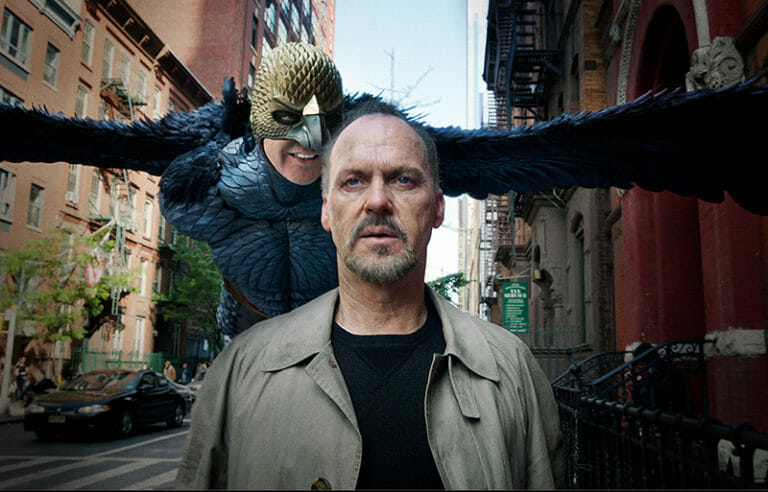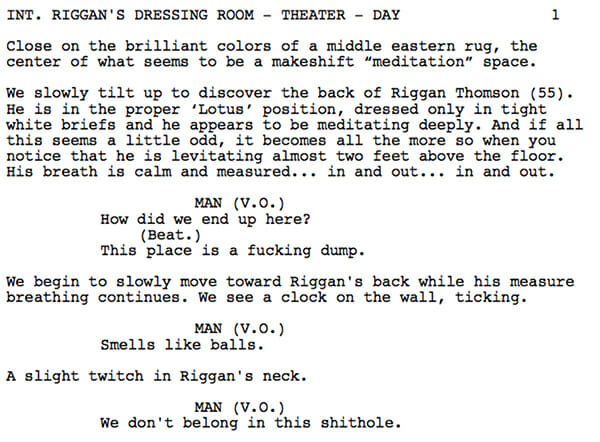Sign up for the
TSL Newsletter
and get $50 off Final Draft 12
By Danielle Karagannis · July 14, 2017

Screenplay by: Alejandro G. Iñárritu, Nicolás Giacobone, Alexander Dinelaris Jr., and Armando Bo.
Birdman portrays a once relevant actor, Riggan, who was loved for his super hero role as Birdman. Riggan grapples (and obsesses) with wanting people to respect him once again, consumed with a crippling fear that he’s seen as a joke and will be forgotten.
Riggan convinces himself that he will re-achieve admiration through directing and starring in a Broadway play, which evidently contributes to his internal struggles. He wants to believe that a prestigious show will make people take him seriously; view him as an artist, yet he continues to feel taunted by his famously known role as Birdman.
It can be easily argued that Birdman depicts a handful of genres and to be fair, it does. Ultimately, though, the film is instantaneously set up with a specific tone: comedic. The writers took no time to establish that whatever kind of film Birdman would be, that through dialogue, beats, and pacing, a comedic mood would exist.
In Birdman, there is a distinct sense of humor – dry, to the point, and honest. There’s no beating around the bush and that’s part of what makes it humorous. The first voice we’re introduced to is the voice over of an unnamed MAN, which turns out to be our lead, Riggan:
Page 1

Come the second page Riggan’s daughter (Sam) is introduced, who possesses the same comedic tenor and beats:
Page 2

Birdman has three main characters: Riggan, Sam, and Mike. Riggan and Sam are exhibited right away (refer to “Pages” under “Establishing tone and/or genre”). By page ten, we aren’t directly introduced to a “Mike”, yet. Instead, Mike’s character is set up.
Within the first ten pages we learn Riggan is the director of and an actor in a play. In that time, one of his actors – of whom he thinks is horrible – becomes critically injured and is officially out of the show (mind you, opening night is near). Which brings us to…
Page 8

Mike is that “someone.”
A clear picture is painted in regard to the world Riggan exists in. To start, we learn that he is a long-time actor trying to gain success through his own project, his daughter is his assistant, and there is chaos – crew is everywhere, people are talking over one another, people are demanding things of Riggan non-stop, there is the sense of tight deadlines, and so forth.
Birdman illustrates a high paced go-go-go environment, successfully achieved by the writers via forcing us to ride beside Riggan (and other characters) – we constantly leave and enter a room with him and along the way, that sense of a chaotic world is constantly displayed.
Page 2 – 5



Birdman is a story that centers on identity, self worth, and happiness. Riggan knows he can continue to play the role of Birdman – find guaranteed (superficial) success and have everyone (mostly) look up to him – but he doesn’t want to earn success that way anymore. He wants to be valued through something that, at least in his eyes, is commendable. Enter: his play, a pained drama that questions the concept of love. Yet, in reality, Riggan chases a skewed perception of “love”, believing this will make everything “right” for and within him.
Riggan is constantly fighting this inner struggle, unable to clearly distinguish himself as an artist vs. human vs. Dad vs. partner vs. Birdman and whether, literally or figuratively, he is his Birdman character.
Page 9 – 10

In this moment we’re introduced to Riggan’s self-judgments and insecurities, which act as the foundation to Birdman’s themes. This is also the first time we hear Birdman, himself, speak – we instantly get a sense of his devious personality.
There are two major things that occur which set up Birdman’s dramatic situation: one is addressed in “Introducing the main characters” above – someone is injured, which is how Mike, a main character, transitions into the story. Throughout Birdman, Mike persistently tests Riggan’s limits, emotionally and physically. This ultimately helps Riggan reach full circle in regard to answering his own questions of self-doubt.
The other is Riggan’s set up as Birdman – alter ego or reality.
Page 1

Riggan is meditating, so maybe we’re witnessing what he’s feeling (the levitation) during this moment of mindfulness. Then again, maybe Riggan isn’t your average individual…
Page 7 – 8

Ralph is the injured actor that Mike replaced. I should rewind, tell you how Ralph’s injury came to be: a light structure fell from the ceiling midst rehearsal and hit Ralph in the head.
Riggan was there and according to him, he “made it happen.” Jake brushes this comment off, because as one may naturally wonder, “Who can make a lighting structure fall with their mind?” As Birdman unfolds, though, we are left to question: does Riggan actually have some kind of power or is this all in his head?
Left open for interpretation, viewers are constantly toyed with the idea that Riggan may be so deep in his mind that he created a destructive alter ego for himself disguised as Birdman, perpetually haunting him. Or, that in actuality, he really is Birdman – a super hero of sorts.
These first ten pages do a fantastic job at setting this important thematic question into motion, while also establishing the film’s plot, characters and unique ‘one-shot’ aesthetic.
 Danielle Karagannis is a writer/director. She currently has a feature script entitled INSOMNIA (ensemble comedy) that’s been accepted into filmmaker labs and is taking her to the 2018 Berlinale / EFM. You can watch Danielle‘s latest film, GIRL (short), here: http://www.daniellekaragannis.
Danielle Karagannis is a writer/director. She currently has a feature script entitled INSOMNIA (ensemble comedy) that’s been accepted into filmmaker labs and is taking her to the 2018 Berlinale / EFM. You can watch Danielle‘s latest film, GIRL (short), here: http://www.daniellekaragannis.
For all the latest from The Script Lab, be sure to follow us on Twitter, Facebook, and Instagram.